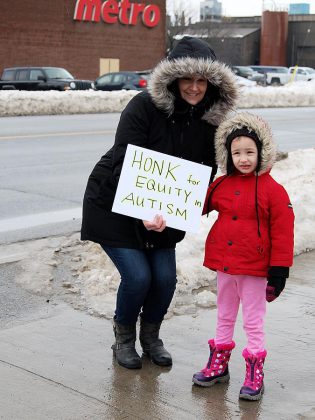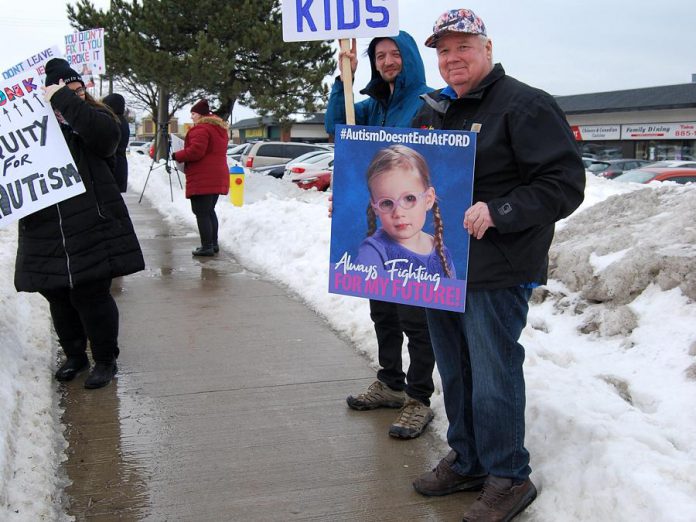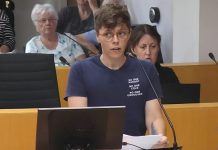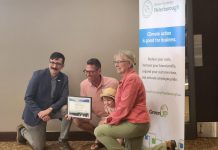
On Friday (February 15), protests against the Ontario government’s changes to funding for autism services took place at MPP constituency offices across the province, including at the Port Hope office of Northumberland—Peterborough South MPP David Piccini.
Piccini’s office happens to be on a major route in the town of Port Hope, and a group of around 25 protesters carried signs to raise awareness of the real cost of decreasing wait times under the Ontario government’s autism funding plan.
“Honk for Equity in Autism” read one sign, and so passing motorists did. Were they to stop and talk to the crowd directly, they would learn the backlash against changes to Ontario’s autism funding makes a great deal of sense.

They would learn that funding under the new program (just like the old one) will not be enough. Beyond this, with big funding cuts, the new changes will likely be much worse for families in need.
On February 6th, Community and Social Services Minister Lisa MacLeod announced the provincial government was taking “decisive action” to help more families with autism, by clearing the wait list for autism services and providing direct financial supports for families of 23,000 children previously not included under the Ontario Autism Program.
However, no new funding is being allocated for the changes. Parents point out the real cost of improving wait times under this new plan: quicker access to care will come at the expense of ongoing funding for the much-needed treatment their sons and daughters require.

Lisa Devine, one of the protesters and a mother of autistic twins, admits it was also a struggle under the previous Liberal government’s plan but her children were making progress. Under the new plan, her family will lose its funding.
“Funding for our twin boys will stop in the next few months,” Devine explains. “We had to wait 18 months to get where we are now. Our boys are in full-time ABA [applied behavioural analysis] therapy and communicating with a system called PECS [picture exchange communication system], which never would have happened without funding.”

In addition to losing funding, both of her sons are now expected to enter the public school system in the fall with no transition plan.
“I’m terrified of what’s going to happen when the school system is not prepared for them. The EA’s [educational assistants] will not be equipped to handle them. I wonder what’s going to happen to my boys.”
Devine and her husband are not alone. Suzi Panovska-Guarrasi also has a six-year-old son with autism who has benefited from government-funded therapy, but will struggle to be able to afford the same level of care under the new program.
“My son is non-verbal and developmentally delayed,” Panovska-Guarrasi says. “My son was on the DFO list (Direct Funding Option), so he has been receiving ABA therapy for about a year now.
“I want people to understand that something so severe can be fixed with therapy. After a year of therapy, he’s now babbling and able to put on a shirt and able to put on his own shoes.”
“But he still has a long way to go. With therapy costing over $80,000 a year, how am I supposed to afford that with only $5,000 of funding each year? This is what they are offering my son.” .
Panovska-Guarrasi wants to be able to keep up with therapy and see the progress her own son has made continue, but she also wants a program that will decrease wait times without diminishing funding support for all families in need.
“I’m here not just for my son. I’m 100 per cent here for the autism community — the ones on the waiting list and those not. I’m also here for the children over 18 who have been failed by the system.”
Marjory Leveille’s son will celebrate his ninth birthday next week. He is no stranger to wait times. Previously, he has waited three years for occupational therapy through the school board, and now he will wait an additional two and a half years for ABA.
“My son and myself are the only people at home, so I do this by myself and it’s very difficult,” Leveille says. “He has a lot of issues. He can’t take care of himself; he has bathroom issues, sensory issues. It’s a struggle, and with no support — and now with the government not supporting, it’s (more) difficult.”
While Leveille definitely understands the government’s need to improve wait times, she says it cannot come at the expense of reducing funding for essential therapies and support.
“Live a day in our life, see what we go through, and see how difficult it is. They [the government] would understand.”
As part of the Ontario government’s changes, funding for treatment will now go straight to the families who need it instead of to regional service providers as it has in the past. Age is a big factor. With the youngest children in the program earmarked to receive the most money over time, the government hopes to invest more in therapy for children under the age of six.
A child in treatment between the ages of two and 18 can receive up to $140,000 in support, but the full amount only applies to a child who enters the program right away. In other words, older children will receive less funding and risk losing access to the level of care that they need.

Grandfather Jack Ferguson holds up a photograph of his granddaughter Lauren, who was born prematurely and diagnosed with autism at the age of two.
“The war started that day,” Ferguson says. “My daughter has paid for a speech therapist from day one. We’ve paid and paid and paid. She finally got (Lauren) on the IBI [intensive behavioural intervention] program and in almost a year she’s had remarkable progress — to us. To anyone else, it would be a small gain, but to us it’s worth every cent.”
“We can’t stop this journey,” he adds. “It just means my retirement is gone.”
As a grandfather, Ferguson says he is going to do whatever it takes to see his granddaughter thrive. Many seniors are similarly dipping into their savings to help their children face rising costs in the Canadian economy. In Ferguson’s case, the sacrifice will be because of government cuts to his granddaughter’s autism funding.
“The sad part is there’s thousands of other families in the same boat and it’s sinking fast,” he says.
“For a lot of families, there’s just no fight left. They’re just trying to keep their families together. Unfortunately, it’s a tough road. We cannot let this happen.”


























